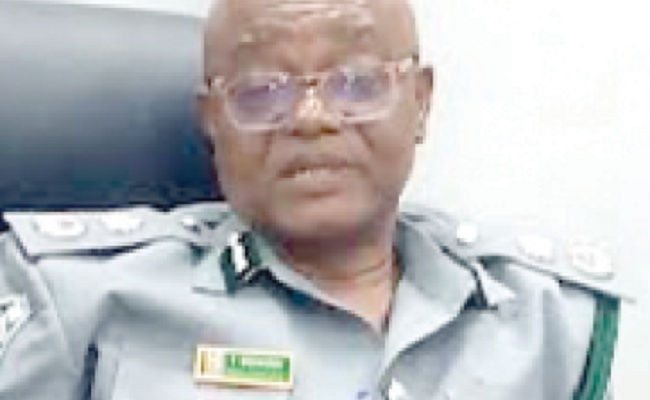
The Seme-Krake border post is the headquarters of the Seme Area Command of the Nigeria Customs Service (NCS). In this interview with selected newsmen, the Customs Area Controller of the Command, Comptroller Timi Bomodi speaks on some of the challenges confronting the Command. TOLA ADENUBI brings the excerpts
IN the past, we had reports that the number of customs agents operating here in Seme declined because of lack of business. Has the situation improved since you came here last year?

Well, you know since the closure of the border, we have not returned to full operations at the joint border post. It is understandable because it is a lot easier to shut it down than it is to restart it. So, it is a gradual process. A lot of people are still not aware that this border is open for full operations. By full operations, I mean that every activity that takes place in the port right now except the importation of used vehicles can also take place at the Seme-Krake joint border posts. So, it is this awareness we want to bring to members of the public that we are open for business. We have the officers here. We have the equipment that will enable us to facilitate all kinds of trade. We do large volume of exports. We also do imports and that is where we rely for our major revenue. That is where we hope from the imports to meet the revenue target set for us by the government. So, true, there has been massive decline in activities here at Seme Joint Border Post. There was slight decline in trade last year when we had issue with Niger Republic and the borders in Niger were closed. So, a lot of activities tickled down to the Command, but since the reopening of the borders, we are almost back to where we were prior to the closing of the borders in Niger. But, we are very optimistic that things will improve.
What is the current volume of exports here?
In our last report, we have been doing quite well in terms of exports. You know that within the subregion, there are lots of trade that take place in terms of the movement of either finished goods under ECOWAS Trade Liberalization Scheme (ETLS), and the movement of other goods, originating goods, either from Nigeria or other West African countries. So, a lot of them pass through this axis and we, if you are looking at it from the point of view of trade of which export is a major part, yes, we are not doing badly. The only challenge is with the imports. That is where we hope to see major improvement.
There has been so many talks about the issue of our borders being porous. How has the Command been able to tackle smuggling?
Talking about the porous nature of our borders, we are not just talking about Seme/Krake Joint Border Post, but borders across the country. I think you have to look at the history behind the creation of these borders in the first place and the socio-cultural issues defining our borders. It is not possible for Nigeria as a country to have clearly delineated borders like either you have walls, or paths that will show this is where Nigeria ends. We have a broad idea of where the borders start and end. We have no man’s land, those are the grey areas, but basically, our borders are defined by the terrains which each of them are located. Here at Badagry, Seme Command, our borders are defined by the ocean, the land and also the rivers that are adjacent, that give access to our neighbours, by this I mean Benin Republic. So, it is easy to move about those countries using these three routes, the ocean, road, bush paths and the rivers. And because of the expanse of the areas and the main points entry, it becomes extremely difficult to physically man these points. That is why Nigeria Customs Service is looking towards technology to provide the tools, the wherewithal in addition to what is on the ground. Technology will bring a major difference because it will allow us from a remote location to monitor activities that are taking place far from us and to make decisions that will be able to stem the tide – be able to curtail the movement of illegal imports or exports of illicit materials.
Has this technology been deployed?
We are in the process of getting them. We are talking about the use of technology which uses satellite imagery to capture the terrains. It is used by members of the Nigeria Armed Forces. We are also talking about unmanned area vehicles commonly known as drones. When you talk about the new project, the e-Customs project, those are things that have been built into that. We are not only looking at scanners, we are looking at other equipment that make trade facilitation easier. We are looking at equipment that will make enforcement easier. That is where we are.
Talking about smuggling, since you came here, would you say it is rising or slowing down?
Well, smuggling is a very complex issue. You cannot look at the statistics and begin to have clear markers as to what the trends are. You are looking at the wide range of products, you are looking at a wide range of potential destination, either inwards or outwards and you are looking at a wide range of methods that are employed by individuals to carry out some of these activities. We know that our enforcement efforts have yielded so many positive results. This year we have made very significant seizures and it cuts across a wide range of items that are either prohibited or customs goods. But we also know that every time we come up with new methods of detecting the activities of smugglers, they also come up with new methods that try to evade capture. But we are not complacent. We are constantly changing our tactics, relying more on intelligence and rejigging our own enforcement architecture to accommodate developing trends. So, that is what we do. Whichever way those smugglers choose to approach us, we are also working out possible means of detecting them.
What types of products are commonly smuggled in or out of the border here?
Well, our easy reference would be from the statistics we have. We have a lot of attempts made to smuggle in rice. Even though we know it is not prohibited, importers do not have free access to Form M, making it virtually impossible but we know that is on the increase. On the export side, people try to smuggle Premium Motor Spirit (PMS) out and then we noticed significant attempt to bring in marijuana, Indian hemp and we have made a lot of seizures in that regard. Lastly, we also see that people try to be engaged in illicit trade on endangered species and we have had major successes also in that area. There are so many areas that our enforcement activities cover, but these are the four key areas and we have recorded successes.
Can you talk about the challenges faced by the Command in discharging its responsibilities?
There is no one without challenges. The challenge I will talk about has to do with the infrastructure itself. As we speak (2024), there is no electricity around here. We get our power from Benin Republic. It will be nice if this Command or Semeis connected to the national grid. As we speak, we don’t have access to pipe borne water. It is a challenge. We have to keep digging boreholes and a lot of it, because we are close to the sea, there are heavy salted content in the water and it affects a lot of things. The roads will be better. I know there is significant progress in the quality of the roads to improve. Some improvement on the road will have positive impact on trade. We also believe that the transit points from Mile 2 to the border itself can be made better if the government gets rid of non-state actors and even some state actors who we believe presently contribute an impediment to entry. We really don’t need many security agencies on the road. We have had many complaints from the business community even other road users – tourists. The complaint about that is because they are not used to that. You don’t see it anywhere else. If you go from this other side, from the Krake side of the border to Aflawi in Ghana, you don’t see what you see here from Agbara to Seme. It is not the best and we believe that if government really takes action we will see change for the better.
What is the relationship between the Command and other agencies?
It is cordial. The Command has very good relationship with other agencies and freight forwarders. We just finished meeting with the leaders of the Association of Nigerian Licensed Customs Agents (ANLCA). So, we have the same thing with other stakeholders. We speak with one voice and when there are challenges that any agency is encountering, we try to figure out how to overcome them.








